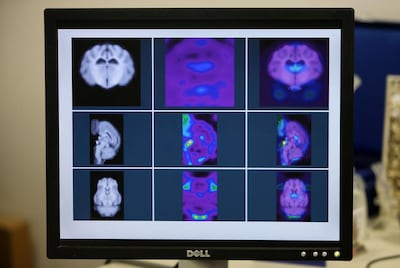A member of Dubai's ruling family has spoken of living with Parkinson's disease.
Sheikh Juma Thani bin Juma Al Maktoum exclusively told The National about his battle with the condition, a progressive nervous system disorder that affects the body's movement.
The 48-year-old father-of-five was diagnosed three years ago at Cleveland Clinic Abu Dhabi.
“Parkinson’s is like a bully. Either you control him or he will control you," he said in an interview.
After treatment, medication and support from specialists, his condition, for which there is no known cure, has stabilised.
"I didn’t know him — that sensation of not knowing what is going on in your system is horrible but now he is here and a part of the family — and I am in control.”
Sheikh Juma's condition began with a barely noticeable tremor in one hand.
“I said it was normal because I do a lot of jet-skiing and fishing, so I use my right arm a lot. I thought it was weakness, but it gradually increased," he said.
Over time, he developed difficulty with walking and tying his shoes.
Later, he felt “anchored to the ground” at times and unable to move.
This is experienced by patients when nerve cells in the brain gradually break down and messages are not properly received around the body.
Managing anxiety and frustration
Sheikh Juma said his condition led to anxiety problems and anger.
“I didn’t know about Parkinson’s," he said.
"I had difficulty in walking. I had difficulty to put on my shoes. I was anchored. I was in a still motion. I didn’t know what was going on with my body."
He was referred to Cleveland Clinic Abu Dhabi's Neurological Institute, where doctors diagnosed his condition.
Sheikh Juma, who is head of the land valuation committee at Dubai Land Department, likens his condition to confronting a bully.
"I went through two phases. Phase one is the bully and phase two is dealing with the bully and him becoming a member of the family," he said.
“You have to accept it. I am diagnosed with a bully before I knew what it was and then I was trained to deal with Parkinson’s."
Sheikh Juma speaks frankly about feelings of isolation, depression and confusion.

“I missed people. I had missed being around people so much," he said of rebuilding his confidence.
Now, he hopes to spread awareness of the condition.
There are no publicly available figures that state how many people in the UAE have Parkinson's.
Cleveland Clinic's Neurological Institute sees about 800 patients, mostly Emiratis. Worldwide, it is estimated that between seven to 10 million people have Parkinson's.
The prevalence of the disease ranges from 41 people per 100,000 in the fourth decade of life, to more than 1,900 people per 100,000 among those who are 80 and older.
Sheikh Juma participated in a Cleveland-organised Ramadan night run this month, where close to 500 people put their best foot forward to raise awareness of Parkinson’s.
Anyone with tremors or movement problems should see a doctor to ensure there is no delay in treatment.
"Please, please, please go to Cleveland or any hospital," Sheikh Juma said.
"The minute Parkinson’s pushes you in this dark endless pit, seek help.”
Drugs and treatment can provide quality of life
Sheikh Juma's doctor, Shivam Mittal, is a consultant neurologist and head of the Parkinson’s disease & movement disorders division at Cleveland Clinic.
He told The National: "Parkinson's disease is a neurological condition. And it's one of the fastest-growing neurodegenerative conditions globally.
"It is a condition where usually it affects elderly people who are above 50 years. Prevalence is increasing every year and it's a condition that affects men more than women."
Treatments include everything from diet and exercise and speech therapy, to drugs that can prevent tremors and ensure a quality of life.
"In layman's language, it is like diabetes. If you have diabetes, you don't have a cure, but you can give medicines like insulin to control the symptoms. It is not similar, but on the same grounds," Dr Mittal said.
"There is no cure but there is very good treatment."





